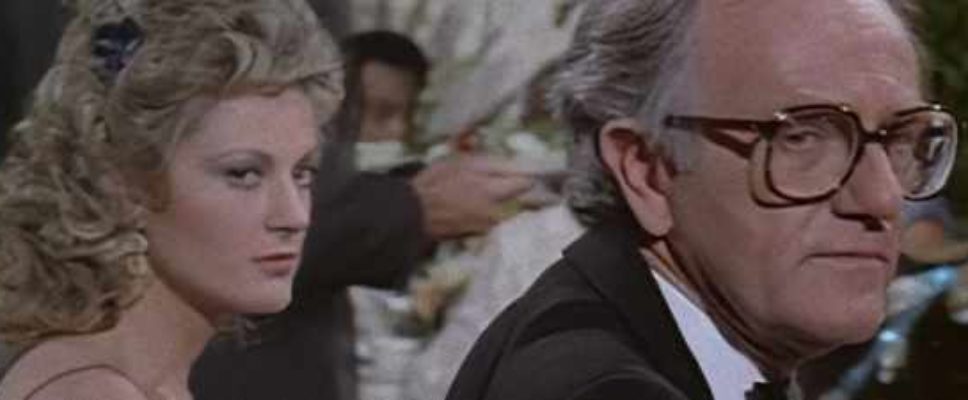Teresa Reviews “Sparkling Cyanide” (1983)
Teresa reviews “Sparkling Cyanide” (1983) and finds it barely palatable.
Fidelity to text: 2 1/2 poison bottles
![]() Colonel Race disappears, the setting changes to contemporary Los Angeles, and events get radically compressed.
Colonel Race disappears, the setting changes to contemporary Los Angeles, and events get radically compressed.
Quality of movie on its own: 2 1/2 poison bottles
![]()
![]()
![]()
Read more of Teresa’s Agatha Christie movie reviews at Peschel Press.
Also, follow Teresa’s discussion of these movies on her podcast.

It’s fine when Agatha rewrites her stories. As a writer, I can understand getting a better idea about an existing property and fixing or improving it to make that story more like the one I see in my head. What ends up on paper is never as good as what I imagine and I suppose Agatha had the same feeling. She rewrote more stories than just “Yellow Iris.” They’re her stories and she knew what she was going for.
I can’t say that about hack scriptwriters rewriting Agatha’s prose, trying to improve it and regularly failing. There can be very good reasons for rewriting: a 90-minute movie doesn’t leave a lot of time for a complicated plot with a dozen, important characters. Novels let us peek inside a character’s mind and observe their innermost heart. Films need action, so internal soliloquies must be replaced with conversation. I expect stories to be compressed. I’m annoyed when perfectly good characters get renamed for no discernible reason.


That last change was unforgivable as it made the villain’s behavior and motivation incomprehensible. No one, even in the movies, would behave that way. To compound the error, one of the three credited screenwriters for this indifferent film was Sue Grafton. You might remember her; she moved on from scriptwriting to the Kinsey Millhone “Alphabet” series of best-selling detective novels, reaching Y is for Yesterday before dying in 2017.
Grafton also wrote A Caribbean Mystery (1983) starring Helen Hayes, meaning she’s got two Agatha adaptations under her belt. After watching this one, I shudder to think what awaits me when Helen Hayes’s Miss Marple films show up in the queue.
In the novel, the events took place over a year. It made sense. Our villainess is Ruth Lessing (get it?), George Barton’s secretary. She falls for Victor Drake and decides that while she wants the handsome, charming cad, she doesn’t want to be poor.


This makes sense, especially the timing. Ruth’s too smart to murder heiresses haphazardly and suspiciously quickly. The passage of a year makes events look more natural.
In the film, Ruth (young, hot, and hyper-competent) is adoring George Barton (old and balding) from afar. He’s married, of course, so she can only pine for him while probably keeping tabs on his wife Rosemary’s extracurricular activities. She’s the classic secretary in love with her boss. I couldn’t quite buy the attraction but whatever.
Then, at dinner in a restaurant, cheating, vindictive Rosemary, dies after her champagne toast was laced with cyanide. Since the setting was shifted to 1980s Los Angeles, we’re spared a fingertip-taste drug analysis. The coroner tells Captain Kemp, LAPD, his opinion based on Rosemary’s body, but it has to be confirmed at the autopsy. That’s so much more plausible. Captain Kemp is competent so he’s not willing to say murder or suicide because he doesn’t have enough facts.


Why Ruth, the adoring and efficient secretary did. While arranging Rosemary’s funeral, she’s also got to get Victor paid off on her boss’ orders and sent out of LA to Buenos Aires and out of everyone’s hair. That’s about when she discovers that George doesn’t love her and will never marry her so Ruth immediately transfers her affections to Victor.
What? All in three days? I can’t accept a capable woman suddenly falling for a ne’er-do-well when all she had to do was remain the competent, loyal, hot secretary to stodgy George Barton and wait six months. He’d have come around and put a ring on it.
Meanwhile, the late Rosemary’s sister Iris flirts with Tony Browne, mysterious visiting British reporter. That’s Anthony Andrews under what looks like caked-on bronzer. He had on more makeup than the ladies which is saying something considering the layers and layers of mascara, eyeshadow, eyebrow pencil, lip gloss, and rouge they wore along with vast quantities of Aqua Net hairspray.


There were good moments, the best being when Tony Brown slowly works out how and why George Barton was murdered and tests his theory on Captain Kemp and Eric Kidderminster. We rarely get to see a detective’s thought processes so well expressed on film. Another plus is the restaurant singer performing Cole Porter’s “I Get a Kick Out of You.”
This was an adequate film, adequately acted, and if you can ignore Ruth’s implausible behavior, you might enjoy it. At least it’s closer to Agatha’s text than the 2003 remake. But really, Sue Grafton should have written a better, more plausible plot. She was adapting the best so it wasn’t like she had to be brilliant. She just had to keep the sparkle.


Read more of Teresa’s Agatha Christie movie reviews at Peschel Press.

